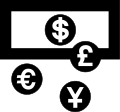Kolion
 From Wikipedia the free encyclopedia
From Wikipedia the free encyclopedia
The topic of this article may not meet Wikipedia's general notability guideline. (September 2022) |
| Part of a series on |
| Numismatics the study of currency |
|---|
 |
This article needs to be updated. (May 2017) |
The kolion is a local currency created to support the farmers of Kolionovo, a small town located 125 km south-east of Moscow. The currency gained notoriety after the creator of the currency, Mikhail Shlyapnikov, was arrested and the kolion was declared illegal tender in Russia.
Design[edit]
Kolion notes are one-sided and come in denominations of one, three, five, ten, twenty-five and fifty Kolion notes. The printed money is multicoloured and each note contains the words;
“This note is the property of the Kolionovo exchequer. It does not undergo inflation, deflation, stagnation or other falsifications. It is not a means of enrichment or speculation. It is supported by the resources of Kolionovo. Or maybe it’s a fake…”[1]
History[edit]
The kolion was created by Mikhail Shlyapnikov in 2014.[2] The kolion is pegged so that 1 kolion is equivalent to 10 kg of potatoes[3] and 2 kolions are pegged at 10 eggs.[citation needed] Because the farmers of Kolionovo received rubles only twice a year, the kolion was created as an alternative currency accepted only in Kolionovo.[4]
In June 2015, Shlyapnikov was arrested and the kolion was declared illegal.[5][6]
References[edit]
- ^ "The absurd trial of a Russian farmer who invented his own inflation-proof currency". 17 June 2015.
- ^ "Russian prosecutors seek to ban 'surrogate money' known as kolions". Russian Legal Information Agency. 1 June 2015. Retrieved 11 June 2016.
- ^ Ivan Nechepurenko (2 June 2015). "Anarchist Russian Farmer to Defend His Village Currency in Court". The Moscow Times. Retrieved 11 June 2016.
- ^ Andrei Kozenko (12 June 2015). "Russian farmer on trial for printing his own monopoly money". Meduza. Retrieved 11 June 2016.
- ^ "Russia: Farmer's 'village currency' lands him in court". BBC. 5 June 2015. Retrieved 11 June 2016.
- ^ "Anger in Moscow as Russian village prints own currency". Al Jazeera. 28 June 2015. Retrieved 11 June 2016.
8. Russian Farmer Alters Rural Economy With Virtual Currency, as Moscow Watches Warily. by Thomas Grove. The Wall Street Journal, April 22, 2018
External links[edit]